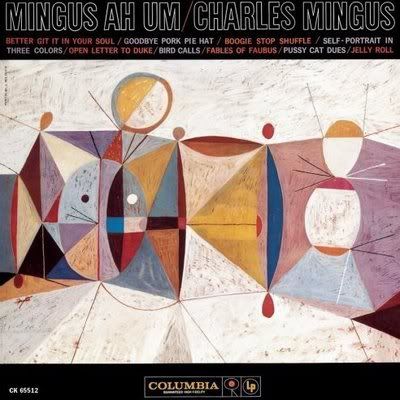
Artist: Charles Mingus
Album: Ah Um
Label: Columbia
Year: 1959
Dear lord, how I've been slacking. Let's get March going as we approach the half-way mark with one of the finest albums from one of jazz's grandest figures, Charles Mingus. By 1959, he had established himself as one of the most important figures in modern jazz, having spent his early career working with the likes of Louis Armstrong and Max Roach, by the mid-1950s, he was releasing superb albums of his own. As they evolved, some jazz purists questioned the liveliness of the music he made, and early in 1959 he made Blues And Roots, as an effort to combat critics who said he didn't "swing" enough. Mingus Ah Um would go even further to show the history of jazz, and it covers all possible elements.
Ah Um really is a history lesson. "Goodbye Pork Pie Hat" is an elegy for Lester Young, a soft song for one of the smoothest tenors to ever play. He also pays tribute to Charlie Parker in "Bird Calls," and Duke Ellington and Jelly Roll Morton's namesakes are also name-dropped in song title. It really paints an autobiographical picture of the album, as people who were clearly vital influences on Mingus's life are paid direct tribute to. Another obvious important part of Mingus's life is race relations, and in "Fables of Faubus," he takes to task Senator Orval Faubus of Arkansas for his anti-integration stance. Though the lyrics are censored on this version, Charles Mingus Presents Charles Mingus features them in full. But even without the lyrics, the song has a powerful punch.
While all of this context is crucial to the album's greatness, it is also one of Mingus's most stylistically diverse. There are some slower, ballad type songs, as well as songs with lots and lots of space. For someone who has so much power in his songs, his subtle approach in songs like "Self-Portrait In Three Colors" and "Pussy Cat Dues" is impressive. And of course, it still features one of his most epic tracks, as Mingus albums tend to open up with. "Better Get It In Your Soul" does what many of his best numbers do: start with a beast of a melody, play themselves out, and return triumphantly and bigger than ever. While the form isn't necessarily unique, Mingus's melodies are often some of the most memorable and wonderful in all of jazz.
1959 was a rather critical year for jazz. Miles Davis recorded Kind Of Blue. Max Roach was on the verge of creating some of his most wonderful music, and bop was on the rise once again. Leave it to Mingus to not only help lead the way for a new generation of bandleaders, but to ensure that none of them forget where they came from.
No comments:
Post a Comment